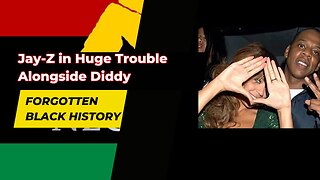Premium Only Content

Black History: WILFRED A. DOMINGO (1889-1968)
The Jamaican-born Wilfred Adolphus Domingo was part of an influential community of West Indian radicals active in Harlem’s New Negro movement in the early 20th century. Domingo was born in Kingston, Jamaica on November 26, 1889, the son of a Jamaican mother and Spanish father. Orphaned at an early age, he was raised by his uncle and attended boarding school in Kingston. In 1912 at the age of 23 he left Jamaica for Boston, Massachusetts before eventually settling in Harlem, New York.
A member of the Socialist Party and a journalist by trade, Domingo contributed to Cyril Briggs’ Crusader and A. Philip Randolph’s Messenger, along with a host of other community publications. He became the first editor of Marcus Garvey’s New World and played a key role in shaping Garvey’s race-conscious, nationalist ideology. However, as a class-conscious member of the Socialist Party, Domingo clashed with Garvey’s capitalist orientation and ultimately broke with the UNIA. At the same time, Domingo was frustrated with the Socialist Party’s failure to make African American rights a priority and drifted toward Briggs’ more militant African Blood Brotherhood, which was closely aligned with the Communist Party in the early 1920s.
In the 1930s Domingo became increasingly focused on his homeland and the issue of Jamaican independence. In 1936 he confounded the Jamaica Progressive League in Harlem, which agitated for Jamaican self-rule, universal suffrage, unionization, and the organization of consumer cooperatives. Domingo returned to Jamaica in 1938 to join Norman Manley’s People’s National Party and served as vice-chair of the Trades Union Advisory Council. After returning to New York in 1947, Domingo broke with the PNP.
Wilfred A. Domingo died in Harlem on February 14, 1968. He was 78 at the time of his death.
-
 18:17
18:17
Forgotten Black History
1 month agoJay-Z in Huge Trouble Alongside Diddy
1381 -
 LIVE
LIVE
Dr Disrespect
7 hours ago🔴LIVE - DR DISRESPECT - PUBG - WHAT WINNING LOOKS LIKE
7,327 watching -
 LIVE
LIVE
Nerdrotic
3 hours ago $7.74 earnedCap 4 and Emelia Perez BACKLASH! Acolyte is Still CANCELED! Hollywood STFU | Friday Night Tights 339
6,258 watching -
 LIVE
LIVE
The Jimmy Dore Show
2 hours agoTulsi SHREDS Intel Agencies in Senate Hearing! Jon Stewart’s Anti-China Propaganda! w/Elaine Culotti
18,292 watching -
 LIVE
LIVE
Afshin Rattansi's Going Underground
23 hours agoMax Blumenthal on US’ Ukraine Aid Corruption, 'Psychotic' Israel Turning the West Bank into Gaza
288 watching -
 23:15
23:15
Bare Knuckle Fighting Championship
1 day agoBKFC FIGHT NIGHT MOHEGAN SUN FREE FIGHTS
6.88K -
 5:49:46
5:49:46
Bitfinex
6 hours agoBitfinex Talks Live at PlanB El Salvador - Day 2
11.7K1 -
 41:47
41:47
Candace Show Podcast
3 hours agoBecoming Brigitte: An Introduction
74.6K99 -
 1:27:41
1:27:41
vivafrei
5 hours agoBernie Gets DESTROYED! Confirmation Hearings RECAP! D.C. Aviation Disaster & MORE!
69.9K58 -
 13:16
13:16
ariellescarcella
4 hours agoThese TikTok 'Trans Women' Converting To Islam Are A Problem...
17.4K9